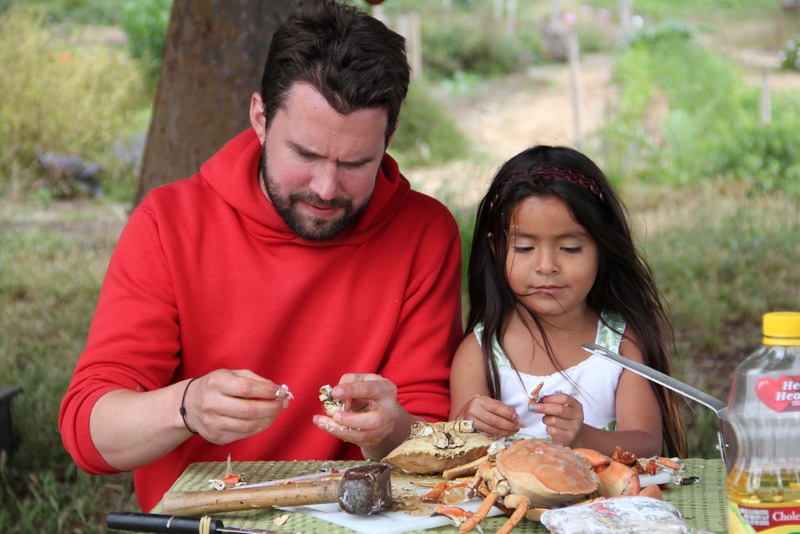These documentary filmmakers want to reach across the aisle - and break through the echo chamber.

Marketers use data these social networks have about users – age, ethnicity, location, socioeconomic status, what they’ve previously interacted with on the network – to sell things. That can be sort of creepy at best (how does this banner ad know I only wear Puma sneakers?), but when applied to news, it creates a self-feeding cycle of polarization. This isn’t necessarily the nebulous concept of fake news; instead, it’s simply that news organizations want their stories to be seen by people who already agree with their (real or perceived) point of view, because we’re more likely to click on something that confirms our beliefs. Wheel back a little, and that leads to extremism: people are only shown, and only see, stuff that they already agree with. The opposing side is unknown and inconceivable.
The Perennial Plate – a team of foodie documentary filmmakers including husband and wife Daniel Klein and Mirra Fine, and editor Hunter Johnson – want to break that cycle, and have pledged to use the very tools that created it to do so.
The stories are designed to induce empathy, not action.
The Perennial Plate typically makes stories about sustainable food around the world. They’ve done videos about sheep herders on a remote Irish island, small coffee farmers in Ethiopia, fly-fishermen in Minnesota, and many more, scoring accolades from Thomas Keller and Michael Pollan along the way. But their new project is something different: they are setting out to document family dinners among immigrants, and then use Facebook’s targeting tools to do the opposite of what a normal marketer would do: They’re going to target people who, according to the data, disagree with them. They’re nearing launch, and the public has already voiced support for the project, to the tune of over $50,000 on Kickstarter.
“The immigrant family dinner series came about from brainstorming after the election, thinking about what we could do as filmmakers that would be different from what we were already doing,” says Klein. Having watched polarization take hold of the US in ugly new ways, the Perennial Plate team wanted to do something to combat that. They wanted to take the stories that had affected their understanding of immigration issues and make sure that people who disagree on those issues experienced those same stories.
The new series – it may be branded slightly differently from other Perennial Plate videos, though that hasn’t been settled yet – consists of five short films, and will debut, Klein hopes, in November. Among the stories are a Somali family in Minnesota, an illegal Mexican immigrant mother with no choice but to illegally drive, and a Syrian family in Nova Scotia who have reconstructed the chocolate business that was destroyed in their home country.

Daniel Klein filming one of his food documentaries.
The videos are intentionally fairly apolitical; there is no mention of how to get involved, or which party or politician is the enemy. “We’re not looking to tell people what to do,” says Klein. “We’re not even trying to identify this as something coming from the right or the left.” Some of the films do straddle that line, though. For example, one of the film features Afghan and Iraqi military translators who moved here after helping the US military. “Using a military translator as a character might come off as from a pacifist, leftist perspective,” he says.
Instead, the goal is to humanize immigrants to those whose algorithm-programed news feeds may not otherwise be exposed to the real and difficult lives of immigrants. The stories are designed to induce empathy, not action. In the past, says Klein, his work has highlighted differences around the world, attempting to find stories to show just how big and varied food cultures are. This project is aiming to do the opposite: to show, through family dinners, just how similar we all are. “We’re looking for stories that everyone, from all walks of life, can identify with,” Klein says.
Over the past summer, as the Perennial Plate team has been working on these stories, they’ve also been researching how to target them properly. The goal is to reach moderates, says Klein, especially in swing states. Going after the extreme anti-immigration groups, he thinks, won’t have much of an effect; those people are locked into their belief systems. But moderates, especially those who live in homogeneous places, may simply not have much experience with immigrants. Klein wants to help people see themselves in these stories. “We get a lot of comments being like, ‘You obviously don’t know conservatives! We care about people!'” he says. “I’m like, ‘I know, that’s why we’re making these videos.'”
Klein didn’t want to lay out his precise targeting strategy for me, partly because it isn’t really possible to have one. This kind of work will necessarily be an experiment, playing around with how to target, how to title, and how to present the videos to score a maximum audience. A full half of the money he’s received via Kickstarter and PayPal donations – over $26,000 – will go towards targeted promotion, but not all at once; they’ll spend it in small doses to figure out what works and what doesn’t. But he may start with small things, like targeting those who have followed or voiced support for certain moderate Republicans.
Klein acknowledges that it’s a little strange to be using the very tools that exacerbated a problem to fight that problem. But he also thinks it might work. “If we’re all reading different news and seeing different stories, then we can never get anywhere,” he says. “So it’s really important for us to put these stories out to different people, and also be willing to listen to other stories, too.”